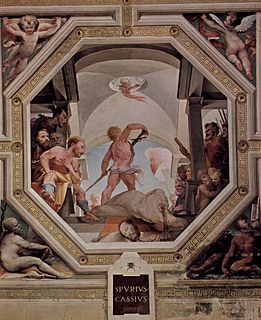Related Research Articles

Spurius Cassius Viscellinus or Vecellinus was one of the most distinguished men of the early Roman Republic. He was three times consul, and celebrated two triumphs. He was the first magister equitum, and the author of the first agrarian law. The year following his last consulship, he was accused of aiming at regal power, and was put to death by the patricians.
Agrarian laws were laws among the Romans regulating the division of the public lands, or ager publicus. In its broader definition, it can also refer to the agricultural laws relating to peasants and husbandmen, or to the general farming class of people of any society.
Lucius Minucius Esquilinus Augurinus was a Roman politician in the 5th century BC, consul in 458 BC, and decemvir from 450 to 449 BC.
The Roman–Etruscan Wars were a series of wars fought between ancient Rome and the Etruscans. Information about many of the wars is limited, particularly those in the early parts of Rome's history, and in large part is known from ancient texts alone. The conquest of Etruria was completed in 265–264 BC.
The gens Verginia or Virginia was a prominent family at Rome, which from an early period was divided into patrician and plebeian branches. The gens was of great antiquity, and frequently filled the highest honors of the state during the early years of the Republic. The first of the family who obtained the consulship was Opiter Verginius Tricostus in 502 BC, the seventh year of the Republic. The plebeian members of the family were also numbered amongst the early tribunes of the people.
Opiter Verginius Tricostus served as consul of the early Roman Republic in 502 BC, with Spurius Cassius Viscellinus. He was the first from the powerful Verginia family to obtain the consulship.
Opiter Verginius Tricostus Esquilinus is the reconstructed name of the consul suffectus who replaced Gaius Servilius Structus Ahala as consul of the Roman Republic in 478 BC. The fact of Servilius' death is not recorded by Livy, nor by Dionysius of Halicarnassus. However the Fasti Capitolini states that Servilius died in office and was replaced by a man most of whose name is obliterated except for the cognomen "Esquilinus".
Caeso Fabius Vibulanus was consul of the Roman republic in 484, 481, and 479 BC. He had earlier held the office of quaestor parricidii in 485 BC in connection with the trial and execution of Spurius Cassius Viscellinus.
Proculus Verginius Tricostus Rutilus was a Roman statesman who served as Consul.
Titus Verginius Tricostus Caeliomontanus was a Roman statesman who served as Consul in 496 BC. He is probably the (older) brother of Aulus Verginius Tricostus Caeliomontanus, consul in 494 BC.
Aulus Verginius Tricostus Caeliomontanus was a Roman Republican politician and general of the gens Verginia. He served as a Roman consul in 494 BC together with Titus Veturius Geminus Cicurinus.
Titus Veturius Geminus Cicurinus was a Roman Republican patrician politician and general of the gens Veturia. He served as a Roman consul in 494 BC together with Aulus Verginius Tricostus Caeliomontanus.
The Roman-Aequian wars were a series of wars during the early expansion of ancient Rome in central Italy against their eastern neighbours, the Aequi.
Vopiscus Julius C. f. L. n. Iulus was a Roman statesman, who held the consulship in 473 BC, a year in which the authority of the Roman magistrates was threatened after the murder of a Tribune of the Plebs.
Titus Veturius Geminus Cicurinus was a Roman politician of the 5th century BC, consul in 462 BC and maybe decemvir in 451 BC.
Gaius Servilius Structus Ahala was a Roman consul in 478 BC. According to the Fasti Capitolini he died in office, and was replaced by Opiter Verginius Tricostus Esquilinus.
Aulus Verginius Tricostus Rutilus was a Roman consul in 476 BC.
Lucius Lucretius Tricipitinus was a Roman senator in the fifth century BC, and was consul with Titus Veturius Geminus Cicurinus in 462 BC.
Titus Verginius Tricostus Caeliomontanus was consul of the Roman Republic in 448 BC with Lars Herminius Aquilinus. Little is known about his life.
Proculus Verginius Tricostus was a consul of the Roman Republic in 435 BC. He was possibly re-elected as consul in 434 BC.
References
- ↑ Livy, Ab Urbe Condita , ii. 48.
- ↑ Fasti Capitolini
- ↑ Livy, Ab Urbe Condita, ii. 48.
- ↑ Livy. iii, 6.8-7.6
- ↑ Broughton, vol i, pp.34-35
| Political offices | ||
|---|---|---|
| Preceded by Marcus Fabius Vibulanus II, Gnaeus Manlius Cincinnatus | Consul of the Roman Republic 479 BC with Caeso Fabius Vibulanus | Succeeded by Lucius Aemilius Mamercus II, Gaius Servilius Structus Ahala (consul 478 BC) |